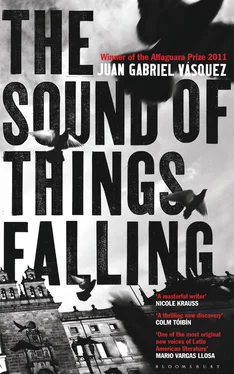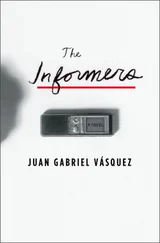‘Oh, finally,’ said Ricardo. ‘Come in, come in, don’t just stand there. These people are here to see you.’
A long time later, remembering that day, Elaine still marvelled at the certainty with which she knew, without any proof or reason to suspect, that Ricardo had lied to her. No, they hadn’t come to see her: Elaine knew it the moment the words were out of his mouth. It was a shiver, an uncomfortable feeling as she shook Carlos’s hand while Carlos didn’t meet her gaze, a certain anxiousness or mistrust at greeting Mike Barbieri in Spanish, asking him how he was, how things were going, why he hadn’t been at the last departmental meeting. Ricardo was sitting in a wicker rocking chair they’d got for a good price at a handicrafts market; the two guests, on wooden stools. In the centre, on the glass top of the table, were some papers that Ricardo snatched up, but on which Elaine managed to see a disorganized drawing, a sort of big ectoplasm in the shape of the American continent, or the shape of the American continent drawn by a child. ‘Hi. What’s up?’ asked Elaine.
‘Mike’s coming to spend Christmas with us,’ said Ricardo.
‘If you don’t mind,’ said Mike.
‘No, of course not,’ said Elaine. ‘And are you coming on your own?’
‘Yeah, just me,’ said Mike. ‘With the two of you, who else could I need?’
Then Carlos stood up, offered Elaine his seat and mumbled something that might or might not have been goodbye, and, raising a fat-fingered hand, began to walk towards the door. A big sweat stain ran down his back. Elaine looked him up and down and noticed that he’d missed a belt loop of his well-pressed trousers and the noise his sandals made and the grey colour of the skin on his heels. Mike Barbieri stayed a while longer, long enough to drink two rum and Cokes and to tell them that a volunteer from Sacramento had come to spend Thanksgiving with him, and showed him how to call the United States with a ham radio. It was magic, pure magic. You had to find a radio buff here and another one in the United States, friendly people willing to lend their radio set and telephone to make the connection, and that way you could talk to your family back home without paying a cent, but it was completely legal, not fraudulent at all, or maybe a little, but who cares: he had talked to his younger sister, to a friend he owed some money and even with an ex-girlfriend from university days, who once threw him out of her life and who now, with time and distance, had forgiven him his worst sins. And all completely free, wasn’t it amazing?
Mike Barbieri spent Christmas Eve with them, and Christmas Day as well, and the rest of the week as well, and New Year’s Eve and New Year’s Day too, and on 2 January he said goodbye as if he were saying goodbye to his family, with tears in his eyes and whole sentences devoted to thanking them for their hospitality, company, affection and the rum and Cokes. They were long days for Elaine, who couldn’t manage to get excited by the holidays in the absence of candy canes and stockings hung by the fireplace and still couldn’t quite understand at what moment this disoriented gringo had settled in with them. But Ricardo seemed to have a marvellous time: ‘He’s the brother I never had,’ he’d say, hugging him. In the evenings, after a couple of drinks, Mike Barbieri took out the weed and rolled a joint, Ricardo would turn on the fan and the three of them would start talking politics, about Nixon and Rojas Pinilla and Misael Pastrana and Edward Kennedy, whose car went off the bridge and into the water, and about Mary Jo Kopechne, the poor girl who was with him and who drowned. Finally Elaine, exhausted, would go to bed. For her, as for the campesinos in her zone, the last week of the year was not a holiday, and she still had to leave the house as early as she could to get to her appointments. When she came home in the evening, dirty and frustrated by the lack of progress and with her calves aching from the hours spent on top of Truman, Ricardo and Mike were waiting for her with a meal almost ready. And after dinner, the same routine: windows wide open, rum, marijuana, Nixon, Rojas Pinilla, the Sea of Tranquillity and how it would change the world, the death of Ho Chi Minh and how it would change the war.
The first Monday of 1970 — a dry, tough, hot day, a day of so much light that the heavens seemed white instead of blue — Elaine rode off on Truman in the direction of Guarinocito, where they were building a school and she was going to talk about a literacy programme the volunteers in the department had begun to coordinate, and when she came around a corner she thought she saw Carlos and Mike Barbieri in the distance. That evening, when she got home, Ricardo had news for her: they’d got him a job, he was going to be away for a couple of days. He was going to bring a couple of televisions from San Andrés, nothing easier, but he would have to sleep over at the destination. That’s how he put it, ‘at the destination’. Elaine was pleased that he was starting to get work: maybe, after all, it wasn’t going to be so hard to make a living as a pilot. ‘Everything’s going well,’ Elaine wrote at the beginning of February. ‘Of course, it’s a thousand times easier to fly a light aircraft once you know how to read the instruments than to make village politicians cooperate with each other.’ She added: ‘And harder still for a woman.’ And then:
One thing I have learned: since the people are used to being told what to do, I have begun to act like a patrón . I’m very sorry to have to report that it gets results. I got the women of Victoria (a nearby village) to demand the doctor organize a nutrition and dental-health campaign. Yes, it’s odd to see the two together, but feeding themselves on sugar-water would destroy anyone’s teeth. So, at least I’ve accomplished something. It’s not much, but it’s a start.
Ricardo is happy, that’s for sure. Like a kid in a candy store. He’s starting to get jobs, not a lot, but enough. He doesn’t have the flying hours to become a commercial pilot yet, but that’s better, because he charges less and they prefer him for that (in Colombia everything’s better if it’s done under the counter). Of course, I see less of him. He leaves very early, flying out of Bogotá and these jobs eat up his day. Sometimes he has to sleep over at his old house, at his parents’ house, on his way out or on his way back, or both. And me here by myself. Sometimes it’s infuriating but I have no right to complain.
Between workdays Ricardo had weeks of leisure time, so in the evenings, when Elaine got home from her frustrating attempts to change the world, Ricardo had had time to get bored and bored again and to start doing things around the house with his toolbox, and the house began to look like a construction site. In March Ricardo built Elaine a shower stall in the patio, which was now a little garden: a wooden cubicle attached to the outside wall of the house that allowed Elaine to take a hose and have a shower under the night sky. In May he built a tool cupboard, and put an impregnable lock the size of a deck of cards on it to discourage any thieves. In June he didn’t build anything, because he was away more than usual: after talking it over with Elaine, he decided to go back to the Flying Club to get his commercial pilot’s licence, which would allow him to transport cargo and, most importantly, passengers. ‘So we’re going to take a serious step,’ he said. Obtaining the licence meant getting almost a hundred more flying hours, as well as ten hours of flying instruction with dual controls, so he spent the weekdays in Bogotá (slept at his old house, got his parents’ news, gave them news of his newlywed life, they all drank a toast and were happy) and went back to La Dorada on Friday afternoons, by train or by bus and once in a chartered taxi. ‘That must have cost a fortune,’ said Elaine. ‘What does it matter,’ he said. ‘I wanted to see you. I wanted to see my wife.’ One of those days he arrived after midnight, not by bus or train or even by taxi, but in a white jeep that invaded the tranquillity of the street with the roar of its engine and the glare of its headlights. ‘I thought you weren’t coming,’ Elaine said. ‘It’s late, I was worried.’ She gestured towards the jeep. ‘Whose is that?’
Читать дальше












